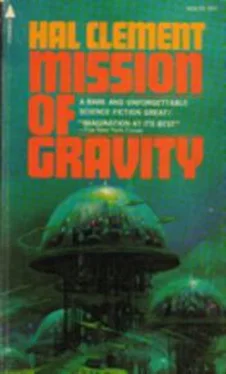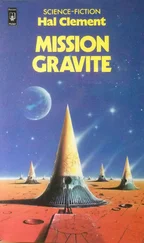Hal Clement - Mission of Gravity
Здесь есть возможность читать онлайн «Hal Clement - Mission of Gravity» весь текст электронной книги совершенно бесплатно (целиком полную версию без сокращений). В некоторых случаях можно слушать аудио, скачать через торрент в формате fb2 и присутствует краткое содержание. Жанр: Фантастика и фэнтези, на английском языке. Описание произведения, (предисловие) а так же отзывы посетителей доступны на портале библиотеки ЛибКат.
- Название:Mission of Gravity
- Автор:
- Жанр:
- Год:неизвестен
- ISBN:нет данных
- Рейтинг книги:4 / 5. Голосов: 1
-
Избранное:Добавить в избранное
- Отзывы:
-
Ваша оценка:
- 80
- 1
- 2
- 3
- 4
- 5
Mission of Gravity: краткое содержание, описание и аннотация
Предлагаем к чтению аннотацию, описание, краткое содержание или предисловие (зависит от того, что написал сам автор книги «Mission of Gravity»). Если вы не нашли необходимую информацию о книге — напишите в комментариях, мы постараемся отыскать её.
Mission of Gravity — читать онлайн бесплатно полную книгу (весь текст) целиком
Ниже представлен текст книги, разбитый по страницам. Система сохранения места последней прочитанной страницы, позволяет с удобством читать онлайн бесплатно книгу «Mission of Gravity», без необходимости каждый раз заново искать на чём Вы остановились. Поставьте закладку, и сможете в любой момент перейти на страницу, на которой закончили чтение.
Интервал:
Закладка:
XVI: VALLEY OF WIND
Barlennan rather expected the riverbanks to become more barren as his ship ascended the stream, but if anything, the reverse was the case. Clumps of sprawling, octopuslike growths hugged the ground at either bank, except where the cliff on his left crowded the river too closely to leave them room. After the first hundred miles from the point where they had waited several streams were seen emptying into the main course; and a number of crewmen swore they saw animals slinking among the plants. The captain was tempted to land a hunting party and await its return, but two considerations decided him against it. One was the wind, which still blew steadily the way he wanted to go; the other was his desire to reach the end of the journey and examine the miraculous machine the Flyers had set down and lost on the polar wastes of his world.
As the journey progressed, the captain grew more and more astonished at the wind; he had never before known it to blow steadily for more than a couple of hundred days in any direction. Now it was not merely maintaining direction but was turning to follow the curve of the cliff, so that it was always practically dead astern. He did not actually let the watch on deck relax completely, but he did not object when a man turned his attention away from his section of rigging for a day or so. He himself had lost count of the number of days since it had been necessary to trim sails.
The river retained its width, as the Flyers had foretold; as they had also intimated was possible, it grew shallower and swifter. This should have slowed the Bree down, and actually did so; but not as much as it might have, for the wind began also to increase. Mile after mile went by, and day after day; and the meteorologists became frantic. Imperceptibly the sun crept higher in its circles about the sky, but much too slowly to convince those scientists that it was responsible for the increased wind force. It became evident to human beings and Mesklinites alike that something about the local physiography must be responsible; and at long last Barlennan became confident enough to stop briefly and land an exploring and hunting party, sure that the wind would still be there when he re-embarked.
It was, and the miles flowed once more under the Bree’s rafts. Eight hundred miles, the Flyers had said. The current of the river made the log indication much more than that, but at last the break that had been foretold appeared in the wall of rock, far ahead of them.
For a time the river flowed straight away from it, and they could see it in profile — a nearly straight slope, angling up at about twenty degrees, projecting from the bottom fifty feet of the cliff. As they approached, the course of the stream bent out away from the wall at last, and they could see that the slope was actually a fan-shaped spill radiating from a cleft less than fifty yards wide. The slope grew steeper within the cut, but might still be climbable; no one could tell until they were close enough to see what sort of debris composed the Spill itself. The first near view was encouraging; where the river touched the foot of the slope, it could be seen to be composed of pebbles small even by the personal standards of the crew members. If they were not too loose, climbing should be easy.
Now they were swinging around to a point directly in front of the opening, and as they did so the wind at last began to change. It angled outward from the cliff, and its speed increased unbelievably. A roar that had sounded as a faint murmur for the last several days in the ears of crewmen and
Earthmen alike now began to swell sharply, and as the Bree came directly opposite the opening in the rock the source of the sound became apparent.
A blast of wind struck the vessel, threatening to split the tough fabric of her sails land sending her angling across the stream away from the wall of rock. At the same instant the roar increased to almost explosive violence and in the space of less than a minute the ship was struggling in a storm that vied with any she had encountered since leaving the equator. It lasted only moments; the sails had already been set to catch a quartering wind, and they put enough upstream motion into the ship’s path to carry her across the worst of the wind before she could run aground. Once out of it, Barlennan hastily turned his vessel to starboard and ran her across the short remaining distance to shore while he collected his wits. This accomplished, he did what was becoming a habit in unfamiliar situations; he called the Earthmen and asked for an explanation. They did not disappoint him; the voice of one of the weather men answered promptly, vibrant with the overtones the captain had learned to associate with human pleasure.
„That accounts for it, Barl! It’s the bowl shape of that plateau! I should say that you’d find it easier to get along up there than we had believed. I can’t see why we didn’t think of it before.”
„Think of what?” The Mesklinite did not actually snarl, but his puzzlement showed clearly to the crew members who heard him.
„Think what a place like that could do in your gravity, climate, and atmosphere. Look: winter in the part of Mesklin you know — the southern hemisphere — coincides with the world’s passage of its closest point to the sun. That’s summer in the north, and the icecap boils off — that’s why you have such terrific and continual storms at that season. We already knew that. The condensing moisture — methane — whatever you want to call it — gives up its heat and warms the air in your hemisphere, even though you don’t see the sun for three or four months. The temperature probably goes up nearly to the boiling point of methane — around minus one forty-five at your surface pressure. Isn’t that so? Don’t you get a good deal warmer in winter?”
„Yes,” admitted Barlennan.
„Very well, then. The higher temperature means that your air doesn’t get thin so rapidly with altitude — you might say the whole atmosphere expands. It expands, and pours over the edge into that bowl you’re beside like water into a sinking soup plate. Then you pass the vernal equinox, the storms the out, and Mesklin starts moving away from the sun. You cool off — right? — and the atmosphere shrinks again; but the bowl has a lot caught inside, with its surface pressure now higher than at the corresponding level outside the bowl. A lot of it spills over, of course, and tends to flow away from the cliff at the bottom — but gets deflected to the left by the planet’s spin. That’s most of the wind that helped you along. The rest is this blast you just crossed, pouring out of the bowl at the only place it can, creating a partial vacuum on either side of the cleft, so that the wind tends to rush toward it from the sides. It’s simple!”
„Did you think of all that while I was crossing the wind belt?” asked Barlennan dryly.
„Sure — came to me in a flash. That’s why I’m sure the air up there must be denser than we expected. See?”
„Frankly, no. However, if you are satisfied I’ll accept it for now. I’m gradually coming to trust the knowledge of you Flyers. However, theory or no theory, what does this mean to us practically? Climbing the slope in the teeth of that wind is not going to be any joke.”
„I’m afraid you’ll have to. It will probably die down eventually, but I imagine it will be some months before the bowl empties — perhaps a couple of Earthly years. I think, if it’s at all possible for you, Barl, it would be worth attempting the climb without waiting.”
Barlennan thought. At the Rim, of course, such a hurricane would pick up a Mesklinite bodily and drive him out of sight in seconds; but at the Rim such a wind could never form, since the air caught in the bowl would have only a tiny fraction of its present weight. That much even Barlennan now had clear.
Читать дальшеИнтервал:
Закладка:
Похожие книги на «Mission of Gravity»
Представляем Вашему вниманию похожие книги на «Mission of Gravity» списком для выбора. Мы отобрали схожую по названию и смыслу литературу в надежде предоставить читателям больше вариантов отыскать новые, интересные, ещё непрочитанные произведения.
Обсуждение, отзывы о книге «Mission of Gravity» и просто собственные мнения читателей. Оставьте ваши комментарии, напишите, что Вы думаете о произведении, его смысле или главных героях. Укажите что конкретно понравилось, а что нет, и почему Вы так считаете.












